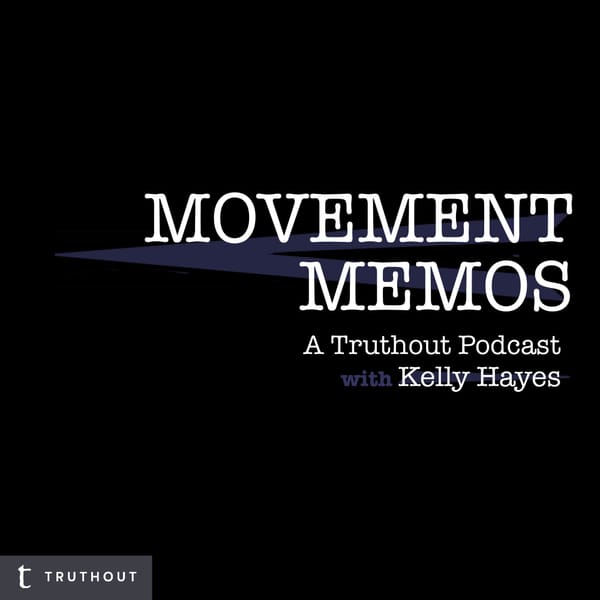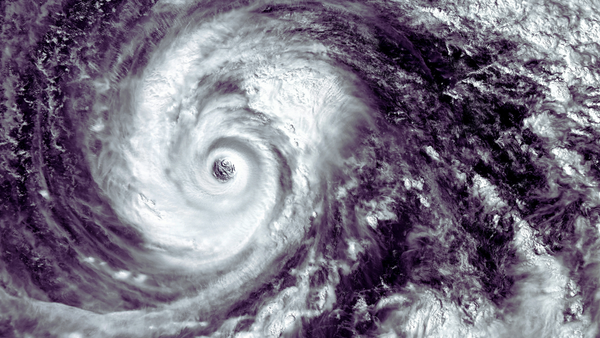RICO Charges Against Stop Cop City Protesters Are an Assault on Solidarity
"Everything that the state has accused the movement of doing is ultimately a projection," says Micah Herskind

Sixty-one people involved with the movement to Stop Cop City were indicted in Georgia on racketeering charges on Tuesday. Stop Cop City organizers with the movement have long warned that such charges might be forthcoming, as part of a stunning crusade by Georgia officials and law enforcement to crush the grassroots movement. On January 18, police raided a tree-sit protest, and assassinated Tortuguita, a 26 year-old queer, non-binary, Indigenous activist who advocated for nonviolent action while living in Weelaunee Forest, in order to resist the construction of Cop City, a $90 million urban warfare training facility for police. Earlier this year, more than 40 people were charged with domestic terrorism for participating in Stop Cop City protests. In May, three organizers with the Atlanta Solidarity Fund were arrested and charged with financial crimes for participating in bail fund organizing. Atlanta officials have also deployed voter suppression tactics in an effort to subvert a referendum campaign that has garnered over 100,000 signatures from Atlanta residents who are opposed to the construction of Cop City. Today, as news that 61 people involved with the movement were facing RICO charges broke, the Atlanta Solidarity Fund stated on social media:
As we've long expected, the State of Georgia today issued a RICO indictment against 60+ activists and others in their latest attempt at shutting down the right to protest in Atlanta. Three Solidarity Fund organizers are included in this indictment. As if Domestic Terrorism charges weren't enough -- or the arrests of bail fund organizers, or activists putting up flyers -- this move seeks to paint the broad spectrum of community members opposed to the Cop City project as conspirators in a vast criminal enterprise. We know these charges will not hold up in court, and we know that they are not intended to: the point is to shut down the social movement currently taking place in Atlanta, and to send a message that anyone advocating for social change could be a target.
In the wake of these indictments, I was able to talk with Stop Cop City organizer Micah Herskind about how we should view these charges, how he and his comrades are holding up, and what people outside of Atlanta can do to support the movement in this moment.
KH: I first heard talk of possible RICO charges back in February. What can you tell us about these indictments and why you think they may be happening at this time. Do you think this is an effort to taint public perception of the referendum, and depict a democratic initiative as the work of a criminal enterprise? I also know the mayor of Atlanta has recently had some bad press, regarding questionable expenditures. Do you think these charges are being deployed to recast the public narrative?
MH: It's hard to pull apart exactly why they're dropping them in this moment, although I think it definitely has to do with the fact that the referendum, for example, has collected over 100,000 signatures. That's 100,000 people in Atlanta who have signed a petition saying we should get to vote on Cop City and whether this thing moves forward. There's been continued delays, more contractors have pulled out. I think that, in a lot of ways, it is a sign of desperation because I think that they know that they have really lost the narrative battle and they've lost in the court of public opinion. And so they're doing what they have been doing for a long time, but just sort of ratcheting up the strategy of taking it to the criminal court and trying to criminalize the movement out of existence.
KH: The indictment itself includes language that suggests collectivism, mutual aid and even the distribution of zines are indicative of criminality or criminal intent. Can you talk a bit about those characterizations?
MH: I am not yet a lawyer, but when you read this indictment, they set out this theory, essentially, that this is an anarchist movement. According to them, every single person, including myself, I'm actually cited in the indictment, is an anarchist. And it's so wild because they go into what they describe as the principles of anarchism, and they're things like mutual aid and solidarity, and caring for each other, and writing letters to people who have been locked up on these political prosecutions, and distributing political information, and talking to each other. And so, the indictment is laying out this theory, basically.
What they identify is that the really problematic nature of this is that it's anti-government and that it's community care, essentially solidarity, and mutual aid absent the government. And that's this dangerous thing according to them. And so it's pretty naked indictment, really, of what they characterized as anarchism or really just as mutual aid, solidarity, caring for each other.
And I want to note that several months ago now, district attorney Sherry Boston, who's the DA for DeKalb County, recused her office from these prosecutions, basically indicating that there's really not the evidence to move forward on these prosecutions. And yet the Attorney General, Chris Carr still decided to move forward with them anyway, move them to a new venue in Fulton County instead of DeKalb County, and work to get these indictments. Of course, you never trust the prosecutor, but even a prosecutor, district attorney Sherry Boston has said that there's not a whole lot there, just like in response to the arrests of the Atlanta Solidarity Bail Fund organizers, a judge said there's not a lot of meat on the bones of this case. And so again, these are pretty transparently political prosecutions that are being weaponized against the movement.
KH: The indictment dates the beginning of the claimed conspiracy as May 25th, 2020, the day George Floyd was murdered by the Minneapolis Police Department. Can you speak to your impression of the significance of that claim?
MH: Again, I'm not an expert in this, but I read it as them really trying to actually take on the broader abolitionist movement, the broader defund movement. Again, I think that they're saying that this began the day George Floyd was murdered, really the time when the demands to abolish policing and transform our society, and transform the status quo, really began to go mainstream. And so I think in a lot of ways, just as Cop City is in part a response to the uprisings and a response to people taking to the streets, this indictment, I think, is a response to the uprisings and it's a response to the movement that's formed against Cop City. And again, I think it's a pretty clear attempt of just weaponizing criminal legal infrastructure to attack political opponents.
KH: What can you tell us about the status of the referendum effort?
MH: So basically the referendum campaign filed a lawsuit in federal court arguing that the city's restrictions on who could collect petition signatures was unconstitutional, and initially won an injunction from a federal judge, which basically said actually anybody should get to collect signatures. And that judge also basically reset the clock under which organizers were gathering the petitions. Then the city appealed that decision and the next court put a stay on that injunction. So basically, currently the status of the validity of the referendum is in limbo, and it will still be heard by the appeals court where there will be a final decision. And so it was always going to be a court battle. It's still going to be a court battle. But organizers are continuing to collect signatures, making sure that they have enough to withstand what will be all of the different efforts by the state to disqualify people.
The city of Atlanta is doing signature matching, and they keep saying that they're not doing it, and then they describe their process, and that process is signature matching. And it's something that Democrats consistently object to, that the Democratic Party of Georgia actually sued the administration over several years ago, and now local Democrats are turning around and doing it for the referendum organizer. So with the referendum, it's going to come down to the court decision. But for now, it's sort of in limbo, and organizers are continuing to get signatures, and I believe preparing to submit them by the time required.
KH: I want to take a moment to acknowledge the murder of Tortuguita. We know that protesters are often vilified and portrayed as dangerous, especially when they disrupt commerce or the workings of the carceral state, but it seems as though the assassination of a forest defender really bolstered the state’s need, in this case, to demonize and monstrasize Stop Cop protesters, in order to justify or overshadow their own violent actions.
MH: This is not my original thought, but really everything that the state has accused the movement of doing is ultimately a projection. So they are saying that the movement is violent, and meanwhile, the only side that has a body count is their side. The only side that has put people in cages is their side. The only side that is wielding the coercive power of the state to attempt to ruin people's lives, whether they can get a conviction or not, is the state. And so they make this accusation because property gets destroyed. And so they talk about property damage. Meanwhile, what are they destroying?
Meanwhile, it's not just even the activists and the organizers who are uncovering what's happening. It's the media outlets, like the SaportaReport, the Atlanta Community Press Collective, who are showing that for the last two years, the administration was lying about the costs of the facility, and that they actually knew all along that it would be over double what they originally promised. And so they say that we’re engaged in misinformation, and meanwhile, they're the ones pedaling it.
They say that we're engaged in a conspiracy. And meanwhile, this is a genuinely decentralized movement. But the conspiracy is the partnership between the Atlanta Police Foundation, the Atlanta Police Department, the Atlanta City Council, the mayor, the governor, the Attorney General, all of these corporations that are on the Atlanta Police Foundation, the Atlanta Committee for Progress, all of them, together with these very forest boundaries between them, and they're changing staff from public to private, they are the conspiracy. They are the ones working together to, despite enormous public opposition, push forward with this project.
It's been said many times, the corporation, whose CEO is spearheading the fundraising campaign, and that donated 10 million to Cop City, owns the Atlanta Journal Constitution, which pumped out the pro Cop City propaganda all the time, along with a bunch of other outlets in Atlanta.
And let me say, the first groups that I heard calling the movement domestic terrorists were the Democrats of Atlanta and their appointees, the police chief, people that they put on their committees, et cetera. And it's a very carefully constructed narrative that they're engaging in to call people domestic terrorists, because we know the image that terrorists evokes. And when you call people terrorists, and you tell police that they're going in the forest to arrest or to get rid of these terrorists, that authorizes an extreme level of violence. And so I've also seen people making the point that this is all of the language of the War on Terror, which came home a long time ago, but it is here. And the connections between the war on terror and what police are doing to organizers, I think, is really important. You call someone a domestic terrorist so that you can march into the forest and assassinate them. That's why you do that.
KH: On a personal note, how are you and your comrades holding up amid these legal attacks?
MH: It's tough because the state's goal here is clearly to scare and intimidate people. Again, they know that convictions don't need to stick in order to ruin people's lives. Many of the defendants who are facing domestic terrorism charges have lost their ability to get an apartment, to keep their job, to pay their rent. There are so many collateral consequences of literally just facing these charges, long before anything goes to court. And so the state has a clear goal of repressing political speech and trying to stop people from expressing opposition to Cop City. And so that's, of course, scary and very real. But I also think that people recognize that the response to repression is collectivity, and is caring for each other and supporting each other, and making sure that we're not going to leave anybody behind. And so even though the state calls it a crime, I do think that solidarity is what we need.
KH: What can people outside of Atlanta do to support you all at this time?
MH: For one, donating to the Atlanta's Solidarity Fund, which I think my understanding is that all these folks who have been indicted are going to be required to surrender and will likely have to post bail, if it's even granted. And so donating to the Solidarity Fund, I think raising as much hell as possible in terms of the implications of this for people everywhere. They are saying that, again, this us a very decentralized movement that is not made up of one organization, is all supposedly the Defend the Atlanta Forest Organization, which does not exist. And so knowing that you don't actually have to be a part of an enterprise or an organization in order for them to file charges against you indicating that you are. I think that the implications of that should scare everyone and it should prompt everyone to action.
I think if you are affiliated with an organization, put out a statement. We need lawyers who are barred in Georgia to represent people. And so if you have connections to Georgia barred attorneys can help. There's other forms of legal support that are needed. And otherwise, I think continuing to follow along for calls to action and ways to support from afar is all helpful.
You can donate to the Atlanta Solidarity fund here.
To learn more about the movement to Stop Cop City, you can also check out these episodes of Movement Memos:




